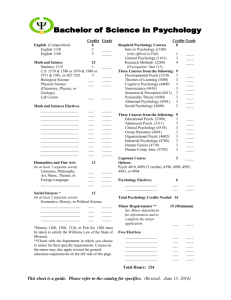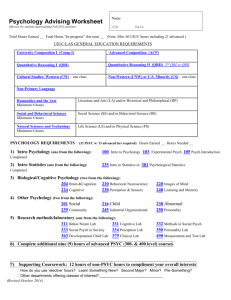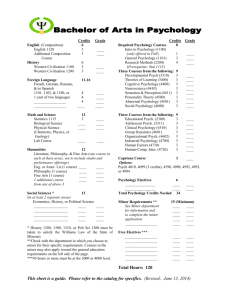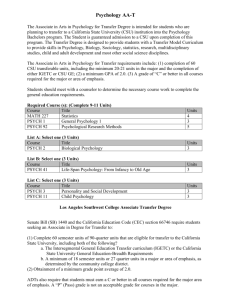Psychology - Penn State Behrend
advertisement
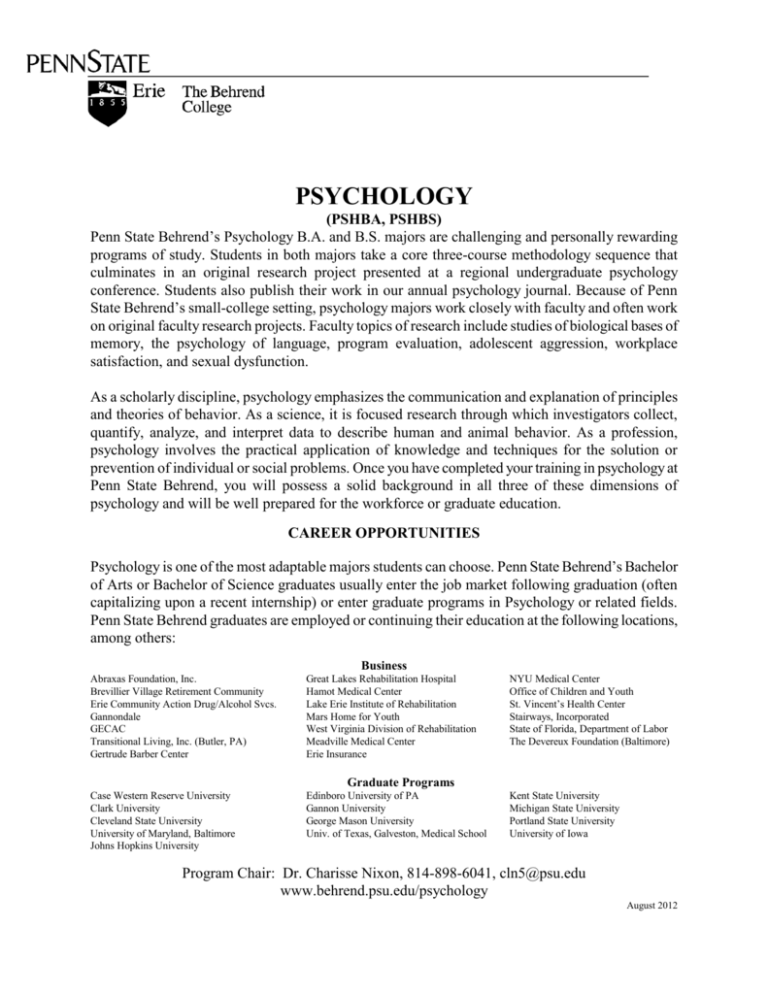
PSYCHOLOGY (PSHBA, PSHBS) Penn State Behrend’s Psychology B.A. and B.S. majors are challenging and personally rewarding programs of study. Students in both majors take a core three-course methodology sequence that culminates in an original research project presented at a regional undergraduate psychology conference. Students also publish their work in our annual psychology journal. Because of Penn State Behrend’s small-college setting, psychology majors work closely with faculty and often work on original faculty research projects. Faculty topics of research include studies of biological bases of memory, the psychology of language, program evaluation, adolescent aggression, workplace satisfaction, and sexual dysfunction. As a scholarly discipline, psychology emphasizes the communication and explanation of principles and theories of behavior. As a science, it is focused research through which investigators collect, quantify, analyze, and interpret data to describe human and animal behavior. As a profession, psychology involves the practical application of knowledge and techniques for the solution or prevention of individual or social problems. Once you have completed your training in psychology at Penn State Behrend, you will possess a solid background in all three of these dimensions of psychology and will be well prepared for the workforce or graduate education. CAREER OPPORTUNITIES Psychology is one of the most adaptable majors students can choose. Penn State Behrend’s Bachelor of Arts or Bachelor of Science graduates usually enter the job market following graduation (often capitalizing upon a recent internship) or enter graduate programs in Psychology or related fields. Penn State Behrend graduates are employed or continuing their education at the following locations, among others: Business Abraxas Foundation, Inc. Brevillier Village Retirement Community Erie Community Action Drug/Alcohol Svcs. Gannondale GECAC Transitional Living, Inc. (Butler, PA) Gertrude Barber Center Great Lakes Rehabilitation Hospital Hamot Medical Center Lake Erie Institute of Rehabilitation Mars Home for Youth West Virginia Division of Rehabilitation Meadville Medical Center Erie Insurance Case Western Reserve University Clark University Cleveland State University University of Maryland, Baltimore Johns Hopkins University Edinboro University of PA Gannon University George Mason University Univ. of Texas, Galveston, Medical School NYU Medical Center Office of Children and Youth St. Vincent’s Health Center Stairways, Incorporated State of Florida, Department of Labor The Devereux Foundation (Baltimore) Graduate Programs Kent State University Michigan State University Portland State University University of Iowa Program Chair: Dr. Charisse Nixon, 814-898-6041, cln5@psu.edu www.behrend.psu.edu/psychology August 2012 PSYCHOLOGY (B.A., B.S., 124 Credits Minimum for Graduation) THE GENERAL EDUCATION REQUIREMENTS APPLY TO BOTH THE B.A. AND B.S. DEGREES Students should review their degree audits via eLion at http://eLion.psu.edu General Education (45 credits) WRITING/SPEAKING (9 cr) ENGL 015 or 030H (GWS) ENGL 202A, B, C, or D (GWS) CAS 100A, B, C, or H (GWS) (3) (3) (3) QUANTIFICATION (6 cr) any GQ course any GQ course (3) (3) NATURAL SCIENCES (9 cr) HEALTH AND PHYSICAL ACTIVITY (3 cr) Students may complete any 9 credits of GN sciences as Students may complete any 3 credits of GHA as long long as one course contains a lab. as the total equals 3 or more credits. (3) (3) (3) Lab course ARTS (6 cr) HUMANITIES (6 cr) GA courses* SOCIAL/BEHAVIORAL (6 cr) GH courses* GS courses* (3) (3) (3) (3) (3) (3) *Courses may not be taken in the area of the student’s primary major. Note: A student may request an exception in order to establish a focus in one area. For example, a student may opt to take one course in the Social & Behavioral Sciences, two in the Arts, and three in the Humanities—referred to as the 3-6-9 sequence. Additional Graduation Requirements First-Year Seminar (Included in electives) Writing Across the Curriculum in the major (W)** International Cultures (IL)**+ United States Cultures (US)**+ **Can also be counted toward General Education or major requirements. + Effective for students enrolling in or after summer session 2005. (1) (3) (3) (3) Bachelor of Arts Degree Requirements (12–24 credits) -------------------------------------------------------------------------------FOREIGN LANGUAGE (0–12 credits): students must attain 12th credit level proficiency. ___________________ (4) ___________________ (4) ___________________ (4) This requirement is governed by a placement policy dictated by the number of levels of foreign language completed prior to admission to college. -------------------------------------------------------------------------------B.A. KNOWLEDGE DOMAINS (9 credits) Formerly, students were required to complete 3 credits in each of three domains (Arts, Humanities, Social & Behavioral Sciences). Effective Summer 2005, students are permitted to complete all 9 credits in any one of six domains or a combination thereof, but courses may not be taken in the area of the _________________________(3) student’s primary major. The six domains are Arts (GA), Humanities (GH), Social & Behavioral Sciences (GS), Natural Sciences (GN), Quantification (GQ), and Foreign Language if the coursework is in a second foreign language or beyond the 12th credit proficiency of the first foreign language. _________________________(3) _________________________(3) See complete list of courses at: http://www.psu.edu/bulletins/bluebook/gened/bad.html -------------------------------------------------------------------------------OTHER CULTURES (3 cr)† ___________________ †Cannot be used to satisfy the U.S. & International Cultures requirement. See: http://www.psu.edu/bulletins/bluebook/gened/bad.html#OCUL Bachelor of Science Degree Requirements B.S. DEGREE (25 credits) MATH (4 cr) MATH 110 or 140 (Fulfills 4 cr. Gen. Ed. GQ) Choose either: * Business Option: G (4) or ** General Psychology Option: G Students choosing the Business option, in consultation with advisor, select at least 21 credits in business courses.* Students choosing the General Psychology option, in consultation with advisor, select at least 21 credits in Science courses.** Students could graduate with a minor in Business or Science. ________________________________________ ( ) _______________________________________ ________________________________________ ( ) _______________________________________ _______________________________________ ( ) _______________________________________ ________________________________________ ( ) ( ) ( ) ( ) * 3 credits of IO Psychology courses can count in the Business Option. **Anatomy, Physiology, and Genetics are strongly recommended. Three credits of biological psychology courses can count in the General Option. REQUIREMENTS FOR THE MAJOR (43 credits) PSYCH 100 (Introductory Psychology) CMPBD 100 (Computing in Humanities & Social Sciences) Students may test out of this course. Students may (3) (1) 4) Clinical/Counseling: PSYCH 140, 238, 414*, 438, 470, 471, 481 Course Chosen: _____________________________________ substitute CMPSC 203 (a GenEd GQ) for CMPBD 100. 5) Diversity: PSYCH 231, 232, 422, 479 RESEARCH CORE (12 cr) PSYCH 200 (GQ) (Elementary Statistics in Psychology) or STAT 200 (GQ) (PSYCH 200 is strongly preferred) PSYCH 301W (Basic Research Methods) PSYCH 406W (Advanced Research Methods) Course Chosen: _____________________________________ (4) (4) (4) BASIC COURSE REQUIREMENT (12 cr) Choose 1 course from at least 4 of the following 5 categories. Taking courses from all 5 categories is strongly suggested. 1) Foundations of Behavior: PSYCH 260, 261, 439, 461, 462 Course Chosen: _____________________________________ 2) Social/Developmental: PSYCH 212, 221, 412, 413*, 414*, 416, 420 Course Chosen: _____________________________________ 3) Cognitive/Experimental: PSYCH 253, 256, 413*, 456, 452, *May be counted for either category, but not both ADVANCED COURSE REQUIREMENT (9 cr) Take three additional 400-level psychology classes. (except 494, 495, or 496) _______________________________________ _______________________________________ _______________________________________ (3) (3) (3) SPECIAL INTEREST (6 cr) Take at least 2 other psychology courses of any level as interest dictates. (3 credits of 494, 495, or 496 may be applied to this requirement.) _______________________________________ _______________________________________ (3) (3) AVAILABLE OPPORTUNITIES: INTERNSHIP: PSYCH 495 (Variable cr.) ( ) 453 Course Chosen: _____________________________________ PSYCHOLOGY MINOR Total of 18 credits in Psychology courses including PSYCH 100 and 6 credits at the 400 level PSYCH 100 (3) (3) (3) (3) (3) (3) Requirements: PSYCH 100, 200, 2.50 GPA overall, 3.00 Psychology GPA, at least 5th semester standing, and approval of site. In certain cases, one or more of the requirements may be waived upon approval of instructor. INDEPENDENT STUDIES: PSYCH 296/494/496 (Variable cr.) ( ) SENIOR THESIS: (Variable cr.) ( ) IMPORTANT POLICIES: Minimum Graduation Requirements for Behrend College Majors. Students graduating from a Behrend College major/minor must achieve a minimum overall grade-point average of 2.0 and earn a C grade or better in all 300- and 400-level courses within the Prescribed, Additional, and Supporting courses as specified in Senate Policy 82-44 and in PSYCH 100, 200 or STAT 200, and in PSYCH 301W. If a student receives a grade below C, he/she must repeat that course, or a division-approved alternative, and earn a C or better. A SAMPLE SCHEDULE (This schedule is an example of the courses a psychology student might take) FIRST-YEAR BACHELOR OF SCIENCE FIRST-YEAR BACHELOR OF ARTS FIRST SEMESTER PSYCH 100 First-Year Seminar ENGL 015 or 030 Natural Science Quantification Humanities GHA, GPA, or GPE FIRST SEMESTER PSYCH 100 First-Year Seminar ENGL 015 or 030 Natural Science Foreign Language Humanities GHA, GPA, or GPE SECOND SEMESTER CMPBD 100 or CMPSC 203 100/200-level PSYCH Natural Science Quantification Arts GHA, GPA, or GPE SECOND SEMESTER CMPBD 100 or CMPSC 203 100/200-level PSYCH Quantification Foreign Language Arts GHA, GPA, or GPE SOPHOMORE B.S. and B.A. PSYCH 200, 301W, and 406W sequence should be started in the first or second semester of the sophomore year. FIRST SEMESTER CAS 100 A, B, or C Schedule PSYCH 100 before PSYCH 301W 100/200 level PSYCH Natural Science or Quantification Arts (for B.S.) / Foreign Language (for B.A.) GHA, GPA, or GPE SECOND SEMESTER ENGL 202A Schedule PSYCH 301W before PSYCH 406W 100/200 level PSYCH 100/200 level PSYCH Social & Behavioral Science (not PSYCH) Humanities JUNIOR B.S. and B.A. Schedule PSYCH 301W before PSYCH 406W Schedule as many PSYCH courses as possible Schedule two 400-level classes Schedule remaining General Education courses Schedule as many remaining courses from checklist as possible SENIOR B.S and B.A. Schedule as many PSYCH courses as possible Schedule two 400-level classes Schedule remaining General Education courses Schedule remaining courses from checklist Investigate Internship (PSYCH 495A), Independent Study (PSYCH 496), and Senior Thesis opportunities FULL-TIME PSYCHOLOGY FACULTY Dr. Dawn G. Blasko (Ph.D., SUNY-Binghamton): Cognitive Psychology Dr. Eric W. Corty (Ph.D., Indiana University-Bloomington): Clinical Psychology Mr. Dennis Dorman (M.Ed., Edinboro University of Pennsylvania): Sociology Dr. Dharma Jairam (Ph.D., University of Nebraska-Lincoln): Educational Psychology Dr. Carl A. Kallgren (Ph.D., Arizona State University): Social Psychology Dr. Victoria A. Kazmerski (Ph.D., SUNY-Stony Brook): Cognitive Neuroscience Dr. Heather Lum (Ph.D., University of Central Florida): Human Factors Ms. Teri A. Milner (A.B.D., University of Nebraska-Lincoln): Internship Coordinator Dr. Charisse L. Nixon (Ph.D., West Virginia University): Developmental Psychology Dr. Clare Porac (Ph.D., New School for Social Research): Neuropsychology and Sensory Psychology Dr. Shariffah Sheik Dawood (Ph.D., University of Leicester, United Kingdom): Industrial/Organizational Psychology Dr. Nicole A. Shoenberger (Ph.D., Bowling Green State University): Sociology and Forensic Psychology Dr. Carol Wilson (Ph.D., Texas A&M University): Social Psychology The faculty in the psychology program at Penn State Behrend are active researchers and scholars as well as excellent teachers and advisors. The psychology faculty regularly publish their research work in national and international journals and present their findings at regional, national, and international conferences. All of the psychology faculty at Penn State Behrend enjoy mentoring and encourage students to take advantage of opportunities to work with them outside of the classroom. For more information, check the Psychology Web site at: pennstatebehrend.psu.edu/psychology This publication is available in alternative media upon request. Penn State is committed to affirmative action, equal opportunity, and the diversity of its workforce.


